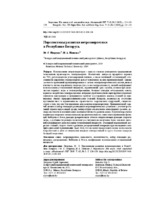Перспективы развития ветроэнергетики в Республике Беларусь

Date
2019Publisher
Another Title
The Prospects for Wind Energy Development in the Republic of Belarus
Bibliographic entry
Петруша, Ю. С. Перспективы развития ветроэнергетики в Республике Беларусь = The Prospects for Wind Energy Development in the Republic of Belarus / Ю. С. Петруша, Н. А. Попкова // Энергетика. Известия высших учебных заведений и энергетических объединений СНГ. – 2019. – № 2. – С. 124-134.
Abstract
Использование ветрогенераторов – одна из главных альтернатив традиционным технологиям производства электроэнергии. Исключение выбросов продуктов горения на ТЭС, работающих на углеводородном топливе, а также топливной составляющей себе-стоимости выработки электроэнергии делает технологию весьма привлекательной. Однако жесткость требований функционирования в составе электроэнергетических систем, низкая плотность потока первичного энергоресурса и его неуправляемость, низкий коэффициент использования установленной мощности, ограниченный срок службы, останов при шквалистых порывах ветра и гололедообразовании, большие площади отчуждаемых земель, шумовое воздействие и инфразвуковые вибрации, проблемы утилизации крупногабаритных элементов конструкции и фундаментов требуют всестороннего анализа условий их применения. Анализ природно-климатических условий Беларуси, несмотря на отсутствие пустынных мест и ограничения на строительство сверхвысоких сооружений, свидетельствует о том, что они благоприятные для развития ветроэнергетики. Принципиальной задачей является выбор площадки размещения ветроэнергетических установок с учетом требований охраны окружающей среды, температурно-влажностного атмосферного режима, рельефа местности и геологических особенностей места расположения. Результаты расчетов параметров ветрового потока показали предпочтительность совместного применения функций Вейбулла и Рэлея, дающих доверительную область аппроксимации функции скорости ветра, а особенности рельефа позволяют рассчитывать на получение более высоких значений коэффициента использования установленной мощности. Очевидной перспективой ветровых станций следует считать развитие распределенной генерации при насыщении электрических сетей технологиями Smart Grid, что позволит предоставить новые возможности потребителям и уйти от монополии мощных электростанций и груза базовых издержек большой энергетики.
Abstract in another language
The use of wind turbines to create wind energy is one of the main alternatives to the traditional technologies of power generation. The exclusion of combustion products emissions at thermal power plants that operate on hydrocarbon fuel, as well as the exclusion of the fuel component of the cost of electricity generation makes the wind power technology very attractive. However, the rigor of the operation requirements of wind turbines as part of power systems, low density of the flow of primary energy source and the lack of control of it, low utilization of installed capacity, limited operating life, shutdowns in the conditions of squally gusts of wind and ice formation, large areas of alienated land, the impact of noise and infrasonic vibrations and the problems of utilization of large-size structural elements and foundations require a comprehen-sive analysis of conditions of wind turbines application. Despite the absence of desert areas and of restrictions on the construction of ultra-high structures the analysis of natural and climatic conditions of Belarus demonstrates favorable natural and landscape conditions for the development of wind power generation. The principal task is to choose the location of wind power plants with due regard to environmental requirements, temperature and humidity conditions, terrain and geological features of the location. The results of calculations of the wind flow conditions showed the preference for the joint application of the Weibull and Rayleigh functions that provide the confidence interval of the approximation of the wind speed function, while the terrain specific features make it possible to expect to obtain higher values of the established capacity utilization factor. The development of a distributed energy generation accompanied by Smart Grid technology wide use over electric networks (which would provide new opportunities for consumers and make it possible to eliminate the monopoly of powerful power plants and to reduce burden of basic costs of big power production) ought to be considered as obvious prospect of wind power plants application.
View/
Collections
- № 2[8]
